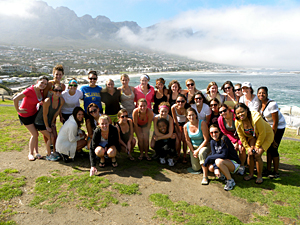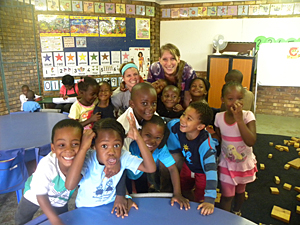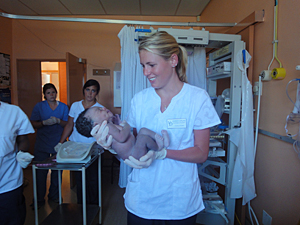ADVERTISEMENT
- Rozovsky wins prestigious NSF Early Career Award
- UD students meet alumni, experience 'closing bell' at NYSE
- Newark Police seek assistance in identifying suspects in robbery
- Rivlin says bipartisan budget action, stronger budget rules key to reversing debt
- Stink bugs shouldn't pose problem until late summer
- Gao to honor Placido Domingo in Washington performance
- Adopt-A-Highway project keeps Lewes road clean
- WVUD's Radiothon fundraiser runs April 1-10
- W.D. Snodgrass Symposium to honor Pulitzer winner
- New guide helps cancer patients manage symptoms
- UD in the News, March 25, 2011
- For the Record, March 25, 2011
- Public opinion expert discusses world views of U.S. in Global Agenda series
- Congressional delegation, dean laud Center for Community Research and Service program
- Center for Political Communication sets symposium on politics, entertainment
- Students work to raise funds, awareness of domestic violence
- Equestrian team wins regional championship in Western riding
- Markell, Harker stress importance of agriculture to Delaware's economy
- Carol A. Ammon MBA Case Competition winners announced
- Prof presents blood-clotting studies at Gordon Research Conference
- Sexual Assault Awareness Month events, programs announced
- Stay connected with Sea Grant, CEOE e-newsletter
- A message to UD regarding the tragedy in Japan
- More News >>
- March 31-May 14: REP stages Neil Simon's 'The Good Doctor'
- April 2: Newark plans annual 'wine and dine'
- April 5: Expert perspective on U.S. health care
- April 5: Comedian Ace Guillen to visit Scrounge
- April 6, May 4: School of Nursing sponsors research lecture series
- April 6-May 4: Confucius Institute presents Chinese Film Series on Wednesdays
- April 6: IPCC's Pachauri to discuss sustainable development in DENIN Dialogue Series
- April 7: 'WVUDstock' radiothon concert announced
- April 8: English Language Institute presents 'Arts in Translation'
- April 9: Green and Healthy Living Expo planned at The Bob
- April 9: Center for Political Communication to host Onion editor
- April 10: Alumni Easter Egg-stravaganza planned
- April 11: CDS session to focus on visual assistive technologies
- April 12: T.J. Stiles to speak at UDLA annual dinner
- April 15, 16: Annual UD push lawnmower tune-up scheduled
- April 15, 16: Master Players series presents iMusic 4, China Magpie
- April 15, 16: Delaware Symphony, UD chorus to perform Mahler work
- April 18: Former NFL Coach Bill Cowher featured in UD Speaks
- April 21-24: Sesame Street Live brings Elmo and friends to The Bob
- April 30: Save the date for Ag Day 2011 at UD
- April 30: Symposium to consider 'Frontiers at the Chemistry-Biology Interface'
- April 30-May 1: Relay for Life set at Delaware Field House
- May 4: Delaware Membrane Protein Symposium announced
- May 5: Northwestern University's Leon Keer to deliver Kerr lecture
- May 7: Women's volleyball team to host second annual Spring Fling
- Through May 3: SPPA announces speakers for 10th annual lecture series
- Through May 4: Global Agenda sees U.S. through others' eyes; World Bank president to speak
- Through May 4: 'Research on Race, Ethnicity, Culture' topic of series
- Through May 9: Black American Studies announces lecture series
- Through May 11: 'Challenges in Jewish Culture' lecture series announced
- Through May 11: Area Studies research featured in speaker series
- Through June 5: 'Andy Warhol: Behind the Camera' on view in Old College Gallery
- Through July 15: 'Bodyscapes' on view at Mechanical Hall Gallery
- More What's Happening >>
- UD calendar >>
- Middle States evaluation team on campus April 5
- Phipps named HR Liaison of the Quarter
- Senior wins iPad for participating in assessment study
- April 19: Procurement Services schedules information sessions
- UD Bookstore announces spring break hours
- HealthyU Wellness Program encourages employees to 'Step into Spring'
- April 8-29: Faculty roundtable series considers student engagement
- GRE is changing; learn more at April 15 info session
- April 30: UD Evening with Blue Rocks set for employees
- Morris Library to be open 24/7 during final exams
- More Campus FYI >>
5:39 p.m., March 2, 2011----Hand sanitizer, clean sheets and rubber gloves are basic supplies in most American hospitals, but a group of nursing students from the University of Delaware recently discovered that these “necessities” are often in short supply in developing countries.
Led by Lisa McBeth-Snyder, instructor and coordinator of UD's Maternal-Child Simulation Lab, 30 junior and senior nursing majors spent UD's 2011 Winter Session in South Africa. They came away with a profound understanding of Third World healthcare conditions.
The trip was supposed to be an observational tour of several public hospitals, but it turned out to be much more. With the prenatal clinics seriously understaffed, the students immediately jumped in to help with routine exams and even medical emergencies.
Two of the young women delivered a baby, and two others provided CPR as first responders at an accident scene, including inserting an airway and directing the paramedics when they finally arrived.
Senior Shannon Copeland intervened in a maternity ward when she was convinced that a woman was closer to delivery than the nurse in charge believed her to be. Invited to examine the patient, Copeland discovered that the newborn's head was already crowning, and she went on to guide the baby boy into the world.
“This was by far my greatest experience in South Africa,” said Copeland. “It was so perfect. I hope to one day become a nurse midwife, and to have this opportunity was beyond amazing. The feeling I got while delivering the baby was just unlike anything else. I'm not even sure if I can adequately put my feelings into words. It was a wonderful experience that I will keep with me for the rest of my life.”
Heather Shearer and Meghan Wilson, also seniors, were at a school in Pretoria when they heard a loud noise and people screaming on the other side of the fence. “When we ran out to see what had happened,” said Wilson, “we saw trees knocked over, a fence mangled, and a huge tractor down at the bottom of the hill that had lost control of its brakes.”
They also noticed that no one was helping out, so the pair applied chest compressions to a woman who was unresponsive and had no discernable pulse until paramedics arrived to take her to a hospital.
“She had a very weak pulse when she left, and we pray that she recovered,” Wilson said. “Their equipment was very far behind the technology we have here in America. I saw the paramedics brace a woman who had a broken arm with a piece of cardboard. Also, there must have been 50-plus bystanders who had no idea how to help out and no idea what CPR was.”
In addition to working six hours a day in hospitals and clinics, the students volunteered at orphanages populated with babies abandoned by HIV-positive mothers. They also helped raise money for these organizations and donated supplies.
“We were there not just to play with the kids,” said senior Bari Melker, “but to actually help the people who run the orphanages. These are places where you can really make a difference.”
“They need so much help, you could stay busy all day,” added senior Rebecca Paulhus.
McBeth-Snyder had expected the trip to be a life-changing experience for her students, but she hadn't realized that it would prove to be the same for herself. “I still haven't adjusted,” she said a month after returning to the U.S. “When you see how much is needed and what needs to be done, it seems so unfair.”
But she plans to take another group to South Africa next year and can't say enough about what this year's group accomplished in their five short weeks there.
“Despite the risk for HIV and other diseases, these students didn't hesitate on so many occasions to help out and make a difference,” she said. “They are really a remarkable group of young women.”
Article by Diane Kukich





